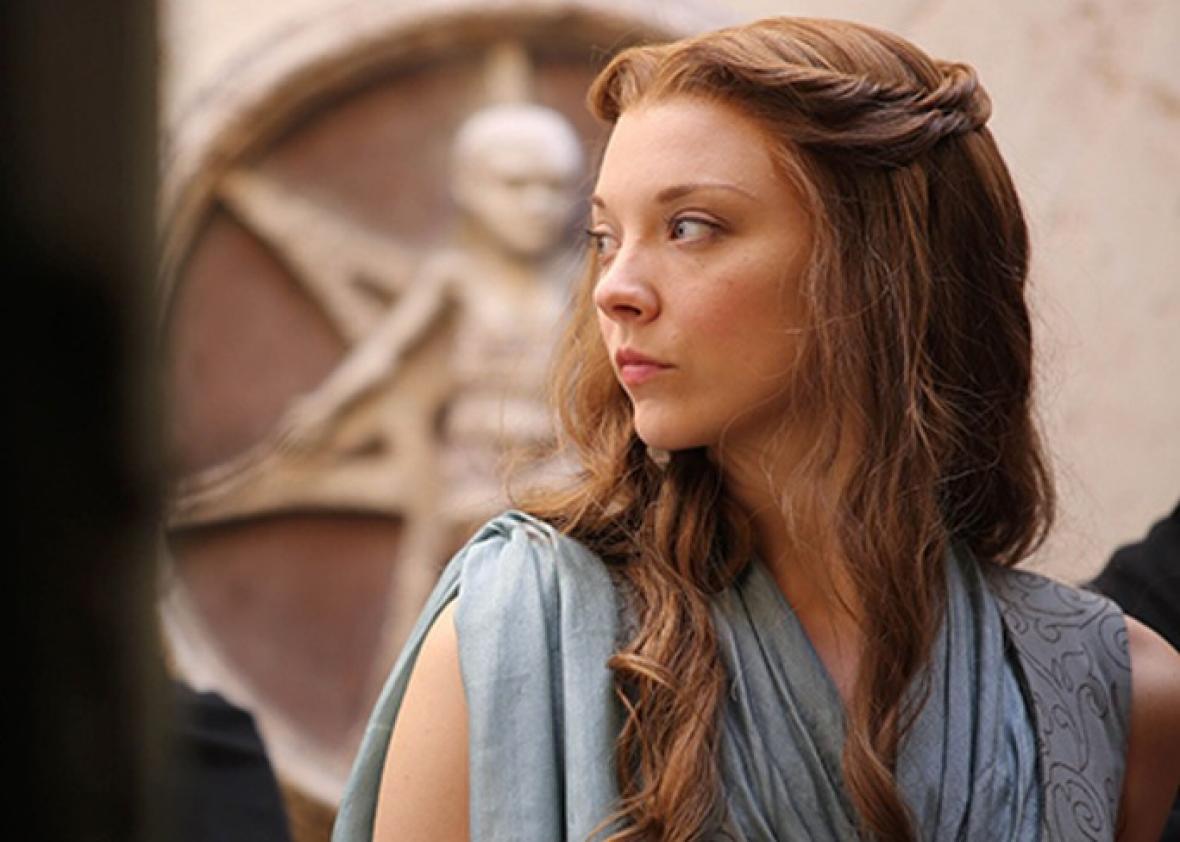This post contains spoilers for the Game of Thrones Season 6 finale.
The Game of Thrones graveyard—which rarely lacks for tenants, violence being a neverending plague in the Seven Kingdoms—received an influx of new arrivals after Sunday night’s finale, from Rickon Stark to Tommen Baratheon to several Freys. Not to mention all the other characters we’ve lost this season, some of whom, like Hodor, were among the show’s most beloved. As we mourn them and look forward to the show’s conclusion, which seems more in reach than ever before, it seems worth taking a special moment to honor Margaery, played by Natalie Dormer, the show’s social-climbing, alliance-shifting, tween-seducing, smirking queen of getting under Cersei’s skin.
Margaery Tyrell twice had the misfortune of marrying a king and seeing that king die. Both times, she dried her tears and quickly found another king-to-be to marry. When we met her in Season 2, she was with Renly, coolly aware that he was sleeping with her brother and just fine with it as long as there was a crown in it for her. After that went pear-shaped, the Tyrell family switched its allegiances to the Lannisters, and Margaery was betrothed to Joffrey. He died at the wedding, and Margaery shrugged, before moving on to his younger brother Tommen.
That’s three kings in all who Margaery managed to ensnare. She had a cockroach-like, or maybe it was Woodersonian (She gets older, they stay … dying), ability to outlast her husbands. If you’re not willing to cheer “Yaaaaaas, girl” for Margaery, you’ve at least got to admire her dedication and ambition. Based on this legacy of self-preservation, I couldn’t have been the only Game of Thrones fan who held out hope that Margaery would make it out of Season 6 alive, that maybe she and Loras would retire to Highgarden and live out a Westerosi sibling version of Will & Grace. It was not to be—Margaery’s longtime rival Cersei blew her up along with the rest of the court, paring the show’s set of players back down to a handful of characters we met early on and who, one assumes, will eventually bring the series home. But the loss of cunning, charismatic Margaery was no small loss for the show overall.
Cersei and Margaery could sometimes seem like they were on a different show from the rest of the cast, a kind of highbrow, high-stakes Real Housewives of Westeros—other characters were out on the battlefield slaying their enemies with swords (or dragons), but Cersei and Margaery were all sniping through the halls of the Red Keep, smiling through their resentment and power struggles. With Tommen, Margaery had finally realized her ambition of becoming queen of the Seven Kingdoms. She didn’t want to take the iron throne for herself, the way Cersei did at end of the finale, with no husbands or sons left to lord over—but she applied a similar ruthlessness to occupying the seat next to it.
Remember Tommen and Margaery’s wedding night? Margaery had been working her way into the new king’s heart through late-night visits, and she won the his affection once and for all when their marriage was consummated, one thing his mother wouldn’t provide for him, after which point Tommen was completely in her thrall. “King Tommen. That still sounds strange to me,” poor, sweet, dim Tommen said to her, some pillow talk on their wedding night. “Does Queen Margaery sound strange to you?” “So strange,” Margaery answered, not selling it because it was so easy to string Tommen along, as if she hadn’t thought about it a thousand times, as if she hadn’t strategized for years to position herself in that very marital bed.
Both Cersei and Margaery were keenly aware of their places in society as women, how much their power was tied up in their beauty and ability to stay in men’s good graces. Cersei was threatened by Margaery’s youth—you could see that as soon as Margaery started showing up in her extreme-V gowns—and compared with Cersei, Margaery seemed worth rooting for. She may not have had the pure heart of a Robb Stark or a Daenerys, but she was at least the lesser of two evils, the Bethenny to Cersei’s Jill Zarin. Margaery used other people as much as any of the show’s aspiring throne-occupiers, but for her it seemed more like a means of survival than a game she was playing for kicks. And it’s hard to imagine a better foil for Cersei. Whereas Cersei’s solution to things not going her way was setting it all ablaze, if there had been a way for Margaery to rule peacefully with any of her husband-kings, you get the feeling that she would have done it, while also reveling in her power, of course.
Margaery fought ’til the end: She had made arrangements for lenience for Loras with the High Sparrow; she was the only one to be concerned when Cersei didn’t show up in court; and she would have escaped if she could have. But not even clever Margaery Tyrell could do anything to outwit wildfire. She embodied the ruthless ambition and mercenary self-interest that characterizes Game of Thrones—but she seemed somehow gentler than her counterparts, a case study in how the brutal moral universe of this show pushes everyone to their darkest extreme.
